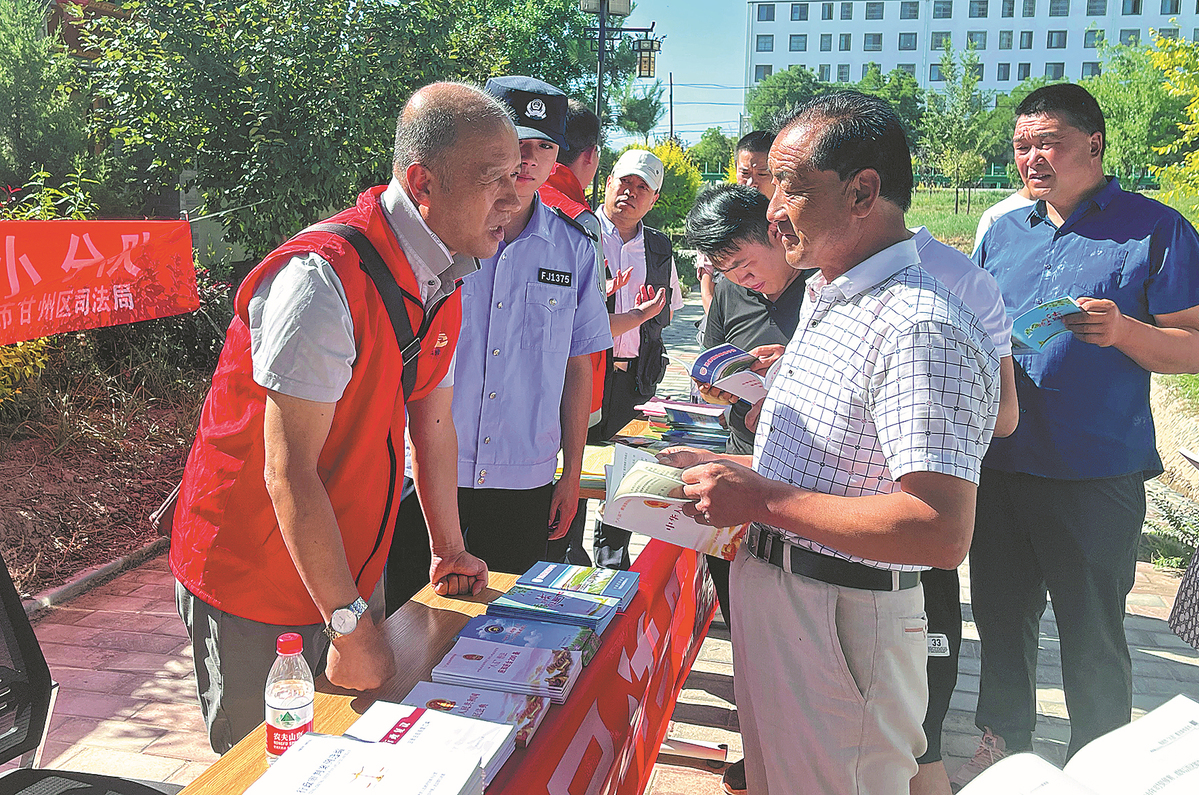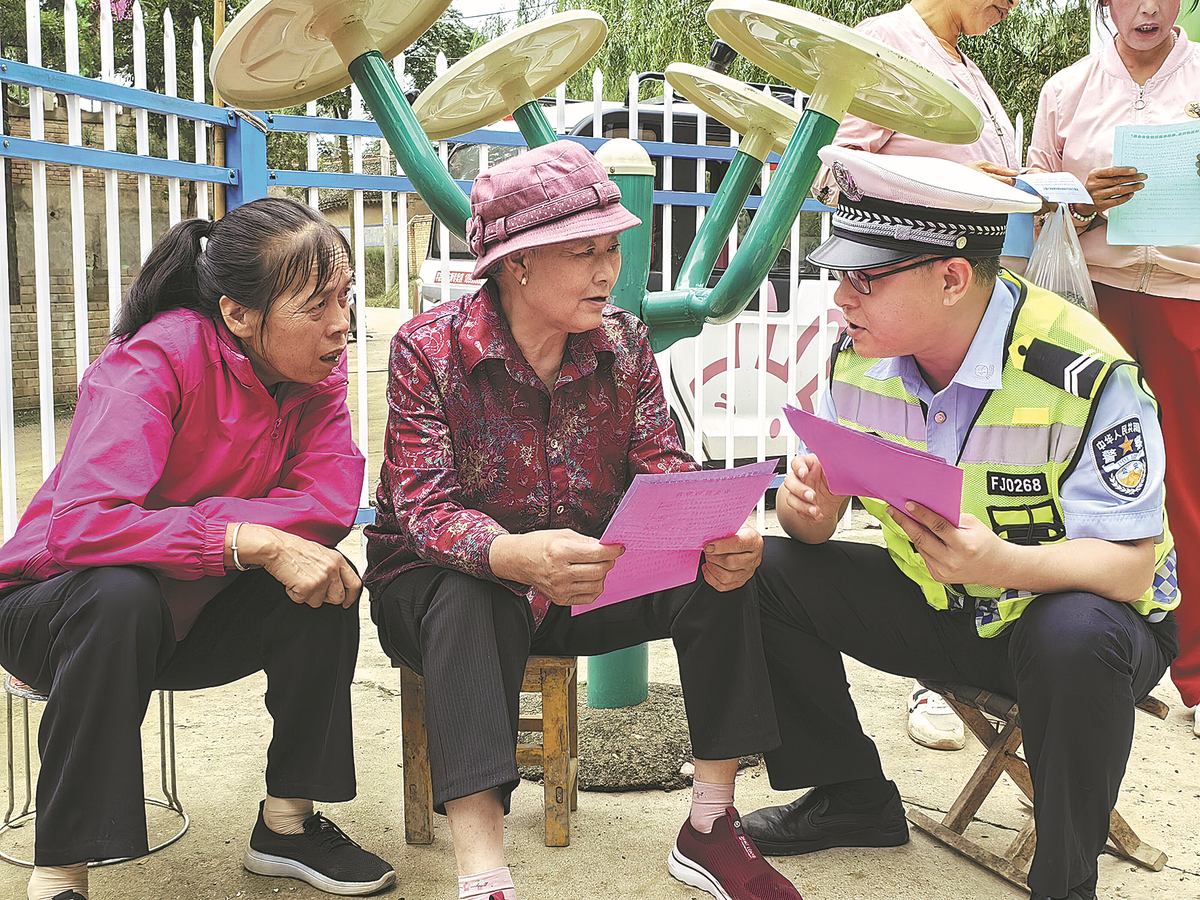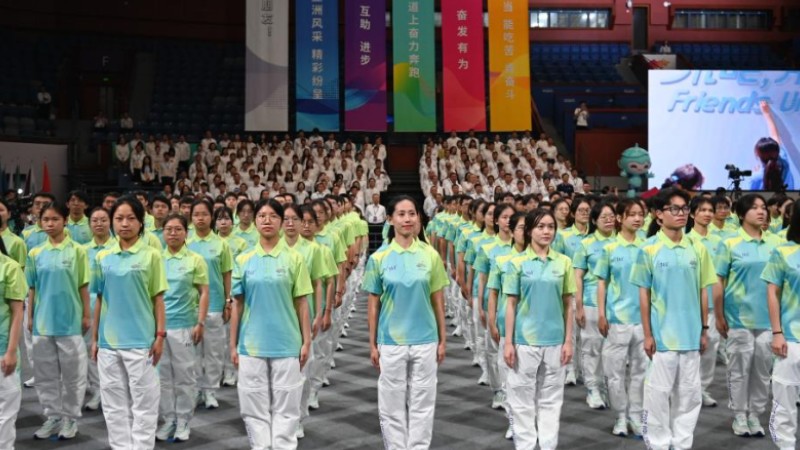Young cadres overseeing rural mediation, legal advice
A new generation of professional advisers is handling issues related to village management and residents' disputes.
Over the past three years, Ma Liangdong, who serves as a village cadre, has become accustomed to keeping his phone on around the clock. That way, he can respond promptly to messages and calls, and quickly mediate in disputes thanks to his knowledge of the law.
The 26-year-old is deputy secretary of the village Party committee in Huanzhuang, a village in Shandan county, Gansu province. He is also a member of the village mediation committee.
In addition to attending training sessions on village management, provided by the township and county governments, and fulfilling his official duties, he can be found in the village committee's office most days.
Though he often deals with minor disputes among villagers, such as when one person's animals eat a neighbor's crops or when adjustments are required to land rental agreements, he finds his role fulfilling. He believes that the process of legal mediation has helped greatly improve his range of skills.
In March 2020, the Central Commission for Law-based Governance, overseen by the Communist Party of China Central Committee, issued a document emphasizing the need to strengthen the rule of law in the rural areas. It detailed improvements to the comprehensive mechanism for the prevention, mediation and resolution of social conflicts to resolve disputes at the grassroots level.
Moreover, governments at all levels were ordered to cultivate teams of dedicated mediators in rural areas and train them in legal knowledge and the relevant skills, harnessing their primary role in resolving grassroots conflicts and disputes.
According to data from the Ministry of Justice, there are about 492,000 village-level mediation committees nationwide, comprising around 2.1 million mediators. Last year, mediation organizations dealt with about 8.9 million disputes across the country, including 3 million that were handled by village mediation committees. The ministry noted that this effectively resolved grassroots conflicts and addressed people's urgent concerns.
Young people like Ma are playing increasingly vital roles in the process of promoting the rule of law in rural areas. Numerous young village cadres study the law and government policies in order to take on roles as mediators and promote effective village management.

Police officers promote legal knowledge in a greenhouse in Pingliang, Gansu province, on March 27. ZHENG BING/FOR CHINA DAILY
Professional approach
Having graduated with a degree in hotel management from Lanzhou Vocational Technical College in Lanzhou, Gansu's capital, in 2016, Ma returned to Huanzhuang, his hometown, to start a business and take part in village affairs. In 2019, he was elected deputy director of the village residential committee, becoming deputy Party chief two years later.
For Ma, transitioning between roles and adapting to changing work requirements have underscored the significance of communication skills and deep legal knowledge when interacting with villagers.
"As a village cadre, when people approach me with questions I can't answer, I seek other ways to understand their concerns, explain matters in a way that is easily understandable and address the issues," he said.
Ma often receives calls from villagers early in the morning. For example, he assists in ensuring that the tap water supply for villagers is reconnected when it has been cut off or in resolving disputes arising from land boundary conflicts. "Times such as spring plowing, autumn harvest and the period around Chinese New Year often see heightened conflicts and disputes in the village. Of these, family conflicts and disputes about adjustments to land rentals are particularly prominent," he said.
Ma said that there are no major conflicts among the villagers because many are relatives or old friends. However, when disputes do arise, mediators can usually resolve them through commonsense methods and also by explaining the law and possible legal consequences. As long as the mediation is done correctly, there won't be any estrangement between the parties, he said.

Volunteers answer questions from villagers at a rule-of-law publicity activity in Suzhan village, Gansu. YANG ZEKUN/CHINA DAILY
Ma acquires legal knowledge in many ways. In addition to reading related literature and studying the popularization of legal platforms launched by government departments, he and his colleagues join police officers and judicial staff on visits to villagers' homes to raise their awareness of the law. This process allows both cadres and residents to gain a robust understanding of fundamental legal knowledge.
Occasionally, villagers may unwittingly engage in illegal behaviors. In such cases, local cadres need to promptly inform them of the relevant legal regulations. For instance, when villagers go to the local public complaints and proposal bureau to protest against perceived inadequate compensation for house demolition, they sometimes leave their elderly parents and toddlers in the bureau's office as a form of pressure, Ma said.
"Through my studies, I've come to understand that such behavior could potentially amount to abandoning the elderly and children. Law enforcement agencies can take action against such individuals. Thus, we approach the people involved, inform them of the legal implications of their actions and encourage them to seek resolution through lawful channels," Ma said.

Law enforcement officers conduct a security check at a delivery base in Pingliang. ZHENG BING/FOR CHINA DAILY
Convention, pragmatism
He said village cadres are constantly shifting between different roles — such as villager, manager and mediator — and they have to adapt their thinking to that particular role, instead of only using their status to order people to do certain things or constrain others. He thinks that village cadres and mediators should acquire a wide range of knowledge, including the law, and take practical steps to help villagers resolve any issues they encounter.
"I firmly believe that the law is the bottom line for all behaviors. By the time villagers confront each other in court, a considerable gap has already opened between them. As the old saying goes, 'Anything beyond the scope of the law is a matter of sentiment'," he said. "Each village has its own set of conventions, formed by gathering input from all the residents and votes on matters. These conventions play a pragmatic role in practice. I think these village conventions have a stronger emotional impact than the law when handling village issues."
At 36 years old, Wang Lingyun is chair of the women's federation in Ruolian, a village in Lanzhou's Honggu district, and also a member of the mediation committee. She said that ways of raising awareness of the law and undertaking dispute mediation in rural areas cannot be learned overnight.
She recalled the first time she and her colleagues visited villagers' homes for interviews: some people were initially resistant and felt that their agricultural work was being disrupted by the visit.
"I've learned that it's important to engage in some casual small talk first, getting to know the people a little before moving onto work-related topics. Or during their breaks, I join them for a chat and introduce legal awareness into our conversation. To truly gain the villagers' trust, you have to get into their hearts," she said.
In the past two years, Wang has seen a significant decline in the number of disputes in the village, mainly due to diligent implementation of local conventions and the dissemination of legal knowledge.
"The village's legal advisers also regularly explain points of law based on the residents' needs. As the villagers begin to understand the regulations, they become more conscious of the legality of their actions, thus reducing disputes," she said.

A police officer hands out leaflets about legal issues to villagers in Pingliang. ZHENG BING/FOR CHINA DAILY
Youthful vigor
As the majority of rural residents are in their 50s or 60s, it can be challenging to gain their assent during the mediation process. The mediators need to patiently inquire about the details from the older villagers and then explain their reasoning and the legal basis for their advice.
Before her present role, Wang ran a beauty salon in Lanzhou's downtown. However, she left to return home to Ruolian to care for her two children, who were studying there. In 2020, she was hired to work as a secretary for the village committee, and by the end of the following year she was appointed as the chairwoman of its women's federation.
Her family was initially not very supportive of her becoming a village cadre, mainly due to the lower income that increased the family's financial burden, but the progress of her work and the positive changes she brought to the village meant that she gradually won her relatives' support. Her children are proud of her work and the changes she's made to the village.
"I gradually fell in love with my current job through practice. I've discovered that the villagers have down-to-earth needs and they expect local cadres to address their practical disputes and difficulties. Participating in village management has allowed me to make significant strides, which will benefit me for a lifetime," she said.
The growing demands of rural management mean many places are nurturing young people to undertake village management and service work, aiming to improve the concept of the rule of law among residents and promote the integrated management of rural areas, she added.
Photos
Related Stories
- China passes new law on barrier-free living environment
- The Law on Foreign Relations of the People's Republic of China
- Draft AI law to be reviewed by China's top legislature
- Internet plays a role in law popularization
- Senior lawmaker stresses need to adhere to socialist rule of law with Chinese characteristics
- Highlights of China's judicial, procuratorial, public security work plan for 2023
- China revises law on wildlife protection
- China's revised law on women protection to take effect on Jan. 1
- Senior Chinese lawmakers meet to hear reports on draft law deliberations
- Draft rules aim to conserve ecosystems
Copyright © 2023 People's Daily Online. All Rights Reserved.









